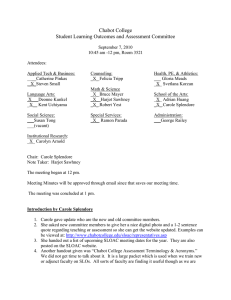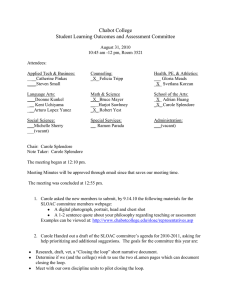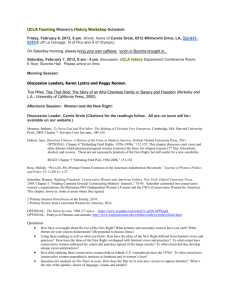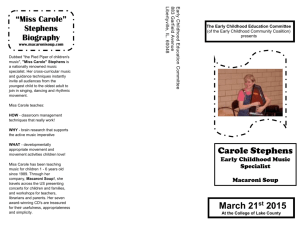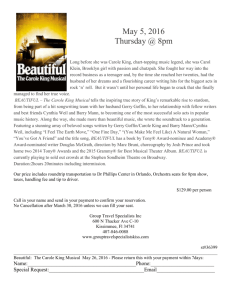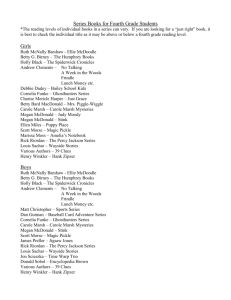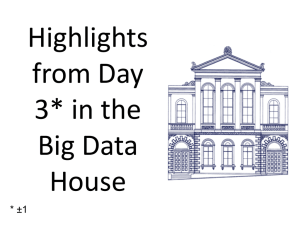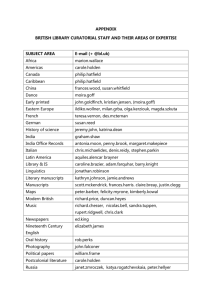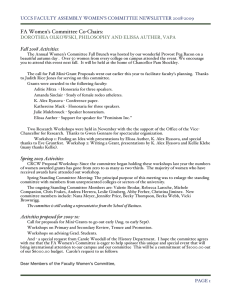Document 11502793
advertisement
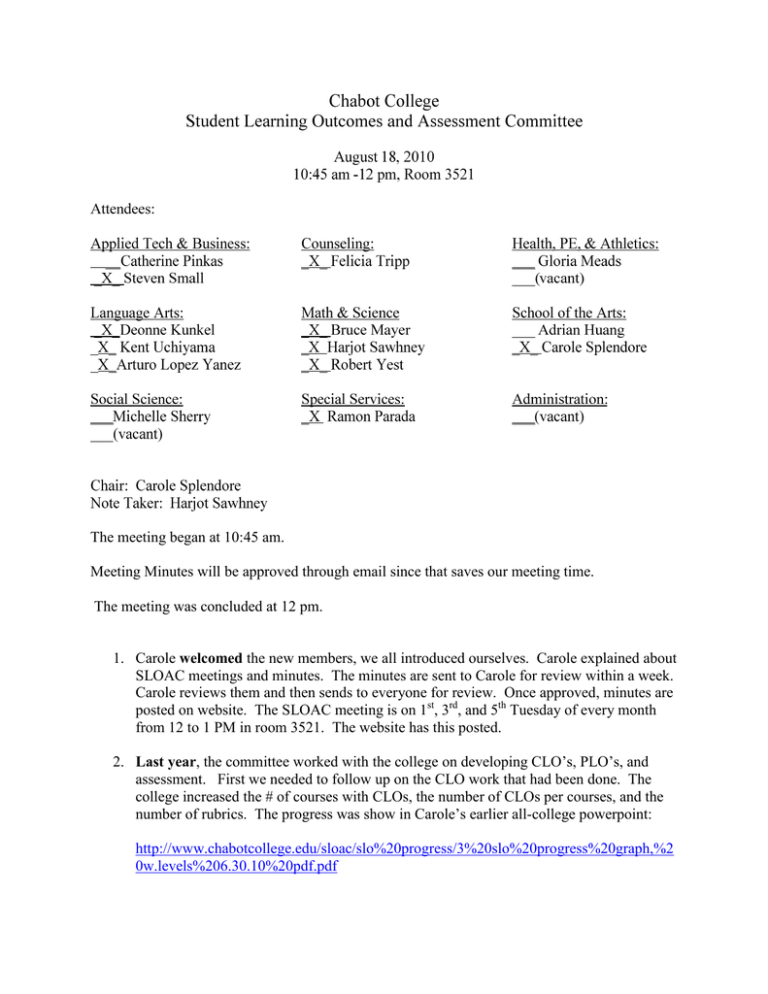
The meeting began at 10:45 am. Meeting Minutes will be approved through email since that saves our meeting time. The meeting was concluded at 12 pm. 1. Carole welcomed the new members, we all introduced ourselves. Carole explained about SLOAC meetings and minutes. The minutes are sent to Carole for review within a week. Carole reviews them and then sends to everyone for review. Once approved, minutes are posted on website. The SLOAC meeting is on 1st, 3rd, and 5th Tuesday of every month from 12 to 1 PM in room 3521. The website has this posted. 2. Last year, the committee worked with the college on developing CLO’s, PLO’s, and assessment. First we needed to follow up on the CLO work that had been done. The college increased the # of courses with CLOs, the number of CLOs per courses, and the number of rubrics. The progress was show in Carole’s earlier all-college powerpoint: http://www.chabotcollege.edu/sloac/slo%20progress/3%20slo%20progress%20graph,%2 0w.levels%206.30.10%20pdf.pdf P age |2 The big goal for last year was to do PLOs, which was necessary to bring us to the Development stage of the WASC SLO rubric. About 40 % of programs did it. There are a lot of programs as we defined it as all degrees, certificates, and disciplines in the absence of those two. There were several factors why some people are not able to complete PLOs. In some disciplines, the classes are only taught by adjuncts. In other disciplines, there is only 1 FT faculty member, who may be overwhelmed by the workload. There are a few interdisciplinary programs which we will start working on next year. Carole outlined that 2/5 of the College-wide learning goals had been piloted, which corresponds to the GE program. The Communication pilot starts today, and two other CWLGs will have to be piloted in the next two semesters. Deonne asked about the WASC take on our progress on this and Carole related that although it was noticed we slid past our original timeline, these pilots combined with The Office of Institutional Research’s indirect assessment of these CWLG since 2002 put us in an ok place, thus we can continue with the pilots and roll out the big GE plan next academic year. Last year, all the committee members helped in brining the college forward with assessment in various ways. Committee members (Carole with Harjot, Bruce with Carolyn,) held workshops on Flex days. In addition, Carole and Bruce held three meetings with Psychology Counseling to help them work with CLOs and rubrics. Deanne did eLumen trainings in the English subdivision. Steven attended and helped at nearly all the eLumen all-college workshops. Jennifer, CTL coordinator and Carolyn, Dir. of IR were great helps as well in running workshops, however this year they will be chairing their own committees. 3. Carole worked all summer, at the WASC ALA, and developing materials for Chabot. Last Spring and this summer she helped create the SLO components to the Academic Program Review and Action Planning Document. There were six meetings last year, sometimes for 2 hours. SLOs were incorporated into program reviews. People can evaluate how well students are achieving their learning goals in their program reviews now. Carole will email the DRAFT program review documents to the committee, who requested them, and DRAFT assessment plans to all the college. Carole went over program review document. In the document, sections I, II, and III are the same as the old unit plan. In fact, unit plans became the part program review document, they are no longer two separate documents or practices. PR is a 3-year cycle. The first year is the development phase. As VP Railey pointed out in his earlier all-college presentation, the first inquiry year is where the bulk of the work is done. How much work is required in the second year depends on the size or ambiguity of the inquiry. The third year one summarizes. Page 3 is inventory/questionnaire/reminder to people about their disciplines progress with CLOs, PLOs, and assessment. The matrix at the end prompts disciplines to close the loop, however we will require additional forms for this as this happens only every 3 years, and we need this information once a semester. P age |3 Next year, this PR document will change based on how we grow with it, and on faculty input. Page 6 is the Action Plan Timeliness. People can ask for support that does not cost money e.g. training, technology. Page 6 also emphasizes the difference between PLOs and program goals. A PLO is student-learning centered outcome/objective. Program goals are broader and are not always about student learning, such as the success of students when they transfer to four-year institution. Alumni surveys may be one way to measure such type of goal. Page 7 ties to Strategic Plan Goals. 4. Work for this year Work on a “Closing the loop” short narrative document, with feedback from faculty. The WASC proficiency stage requires assessment results be filed with the office on a regular basis, most colleges and universities ask for a short narrative. Determine if we (and the college) wish to use the two eLumen pages which can document closing the loop, assessment analysis, and actions. Carole can run a report to see if these have been filled out, but the contents of the pages remain confidential for the faculty. Bruce spoke of the importance of closing the loop. The idea is: Do not do the same thing over and over. Make an effort to change your method to improve learning. Use eLumen to record what you chose to assess. Observe what happened and what you measured. If no change is needed, focus on assessing something else that needs improvement. Additionally, the SLO may be changed. Support disciplines to move forward in CLOs, PLOs, and assessment. Carole will have meetings with Art discipline, as a pilot. We are encouraged to work with our own disciplines in a pilot form, seeing how our documents work for folks. Many of the members had done this last year. We will adapt, and move on to helping another discipline in our division that seeks help, etc. Additionally, Carole (and others if possible) will continue to assist disciplines that reach out to her for help such as Fire Tech and Counseling, so that they can be supported in a timely way. This speaks of the necessity for strong SLOAC membership. We need to help support and build the discipline leads within our own divisions. The committee will start reviewing documents such as CLOs, rubrics, PLOs. PLO mapping is at this state very fragile, as we only asked for 2 PLOs. Also, the linkage to capstone courses, where PLO data will be pulled is weak. If CLO data is not aligned well with PLO, the PLO will need to be assessed directly or qualitative assessment could be used. We will seek leadership outside the SLOAC, to lead the Qualitative assessment FIG group, from faculty who are well-versed in this form of assessment, perhaps from Social Science. CWLG FIGS (which Carolyn has been leading) will continue, this semester for Communication. Two out of five pilots are done, but we are behind schedule. All five should have finished by now. We do have the indirect assessment of the CWLGs from the 2002 – current student satisfaction surveys. We have to complete one direct assessment pilot every semester for three semesters to be on target by May 2012. Carolyn is going on sabbatical in the Spring 2011 so something will have to be P age |4 worked out. Electronic portfolios may be used in future interdisciplinary figs where a single artifact can not yield actionable data, for Development of the Whole Person, for example. The committee will defer work on PLO’s for interdisciplinary programs such as Puente, for the next academic year, as they can be complex. 5. Miscellaneous Carole talked about the WASC ALA (assessment leadership academy) course. There are 30 people enrolled, 7 of them are from community colleges. Carole is one of them. They are Deans, SLO coordinators, accreditation specialists, etc. It is a 10 month hybrid course. This course builds leaders in the region of assessment. It is all about creating learning environments within classroom. Carole gave handout “Science of Learning” to committee members, as fuel for the upcoming brown bag discussion. A question was raised by Felicia Tripp if the SLOAC committee would discuss learnercentered issues, as it is of this philosophy. Unfortunately, the committee has a lot of practical work to do and uses the meeting for this, but the Brown bag workshops were developed to attend to this need. Additionally the community can use the workshops to voice SLO concerns. 6. Agenda for next meeting Go over the Intro to SLOs for faculty handout packet. Recap what disciplines have completed, what disciplines need help. Carole will look into course assessment schedules and PLOs. Make sure the computer is up, we can look at website, eLumen together. May need more time on what we want to accomplish, more clarification, systematic outline the goals. One person (Harjot) will take notes, other person can write on board the action items. Process person will give feedback (outline/review) in the end. Wednesday, Aug 25th, 2-4 PM, room 119 (library) Creating Assessment Plans Workshop. Carole will chair this workshop. There were about 40 people these workshops so far. Wednesday, Sep 1st, 12-1PM, brown bag workshop on the “Science of Learning in the Brain” reading will be in room 3521.
